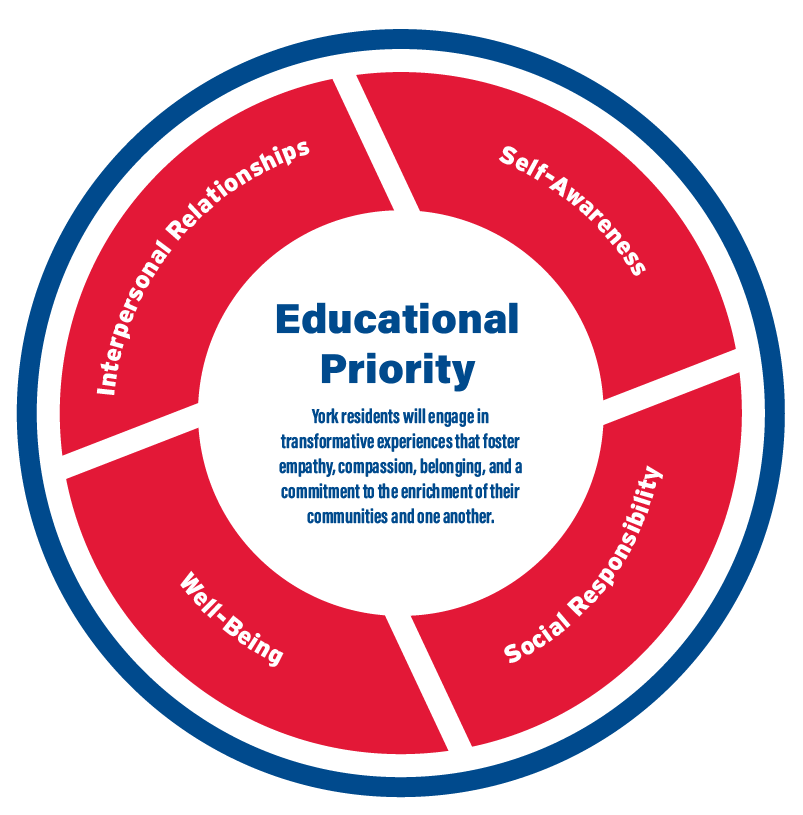
Our Educational Priority is our aspiration for all residents in our communities: York residents will engage in transformative experiences that foster empathy, compassion, belonging, and a commitment to the enrichment of their communities and one another.
Learning Goals & Outcomes
Our Educational Priority is broken down into four overarching Learning Goals that guide our programming and initiatives within residence. Each Learning Goal has a series of associated Learning Outcomes that we intend for residents to achieve throughout their time in residence.
Self-Awareness
![]()
Self-Awareness is a process of self-discovery on the path to self-actualization. This awareness is achieved through a critical examination of one’s own identities, positionality, and perspectives. Self-Awareness enables emotional intelligence through which individuals can manage their thoughts, feelings, and actions in relation to their intent and impact. Through reflection, self-aware people are able to develop and demonstrate awareness of their capabilities and set goals for continued self-improvement. Self-Awareness fosters a sense of purpose and allows individuals to understand themselves in relation to the communities they are in.
Residents will be able to:
- Identify their positionality.
- Demonstrate emotional intelligence while navigating unfamiliar or complex circumstances.
- Acknowledge gifts and areas of growth.
- Self-define personal, professional, and academic goals.
Interpersonal Relationships
![]()
Interpersonal Relationships is the ability to build and maintain supportive relationships with others. Healthy Interpersonal Relationships are developed and maintained through respect, inclusion, a recognition of boundaries, and embracing difference; as such, they also require the capability to navigate controversy and conflict with humility, open-heartedness, and emotional intelligence. Interpersonal Relationships require one to think beyond themself and both recognize the importance of and genuinely value connection with others.
Residents will be able to:
- Consider the importance and value of interdependence and interconnectedness.
- Respect the boundaries of people they interact with.
- Engage in appropriate conflict resolution behaviours.
- Build meaningful, healthy relationships with members of their communities.
Well-Being
![]()
Well-Being comprises one’s mental, spiritual/cultural, sexual, and physical health and is an ongoing practice. People experiencing Well-Being are able to honour their thoughts and feelings without judgement and embrace learning and adversity with self-compassion and tenacity; additionally, Well-Being contributes to a sense of joy and optimism. Well-Being requires a recognition of what supports and what harms oneself and engaging in behaviours that contribute to one’s health. Through developing help-seeking behaviours and resourcefulness, one is able to access supports and develop skills that contribute to their Well-Being and a sense of empowerment.
Residents will be able to:
- Honour themselves when navigating novel or challenging experiences.
- Identify supports and strategies that strengthen their resilience.
- Advocate for their well-being needs.
- Engage in behaviours that contribute to their mental, spiritual/cultural, sexual, and physical health.
Social Responsibility
![]()
Social Responsibility exists on a continuum of awareness to action. Socially responsible citizens exhibit a capacity for empathy and recognition of the ways that power is socially constructed (both historically and contemporarily) and inequitably distributed. Social Responsibility demands a commitment to justice for equity-seeking peoples and centres those people in shared commitments and decision-making; doing so requires cooperation and collective action. Social Responsibility is rooted in a recognition of our relationality and responsibilities to each other and the land. To engage in socially responsible behaviour, one must also engage in internal work to develop a sense of ethics, awareness, and accountability.
Residents will be able to:
- Discuss the construction and manifestation of power, privilege, and oppression.
- Participate in cooperative actions that support social justice.
- Act upon principles of sustainability.
The Residence Life Team engages residents through a variety of learning strategies to achieve our Educational Priority. These strategies include:
- House Meetings: House Meetings are opportunities for members of each house to connect with their Don and housemates to discuss important updates, community concerns, get to know one another, and engage in activities.
- Active Programs: Active Programs are building-wide events facilitated by Residence Life Staff and campus partners to foster learning and growth for residents.
- Learning Conversations: Learning Conversations are intentional one-on-one conversations that Dons have with members of their house to encourage reflection, provide support, and connect residents with useful resources as needed.
- Newsletters: Newsletters are sent from the Residence Life Management Team throughout the year with resources, opportunities for reflection, and resources to support residents’ well-being, learning, and growth.
- Bulletin Boards: Bulletin Boards are posted throughout the building with valuable resources, information, and opportunities for reflection.
- Social Media Campaigns: Social Media Campaigns are hosted throughout the year to ensure residents are aware of resources and learning opportunities, and provide residents an opportunity to reflect and learn.

Connect with York University